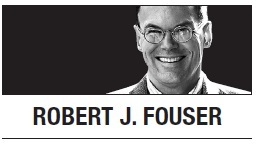 Since assuming the presidency on Jan. 20, Donald Trump has moved rapidly to make sweeping changes in the US. He has issued a series of executive orders aimed at fulfilling campaign promises. The orders cover important areas on trade, immigration, and international relations. The swift actions have pleased his political base, but have stirred intense anger among his opponents
Since assuming the presidency on Jan. 20, Donald Trump has moved rapidly to make sweeping changes in the US. He has issued a series of executive orders aimed at fulfilling campaign promises. The orders cover important areas on trade, immigration, and international relations. The swift actions have pleased his political base, but have stirred intense anger among his opponentsIn the process, Trump has dominated the news as no US president has done in recent memory. For all the coverage, nobody really knows who he is. Every Twitter post is dissected for clues to who he really is and what it means. This has created an eerie unease about the future direction of his presidency.
Amid the near-chaos, two competing theories of President Trump are beginning to emerge. The first theory holds that Trump is hard-nosed deal-maker who uses whatever tools are at his disposal to make an advantageous deal. According to this theory, Trump’s baseless comments about inaugural crowd size and voter fraud in the last election are part of a complex negotiation strategy aimed at giving him the upper hand. His harsh criticism of the media combined with endless braggadocio are designed to keep his opponents off balance while keeping him in the spotlight. The core of this theory is that Donald Trump is a rational human being.
The second theory holds that Trump is an immature 5-year-old. Like any ego-centric 5-year-old, he needs instant gratification and throws tantrums when he doesn’t get his way. His wealth allows him to play out his narcissistic fantasies on a grand scale and to bully opponents into silence. The core of this theory is that Donald Trump is an irrational being who is inherently unstable and therefore unfit to be president of the US.
The deal-maker theory remains dominant among the political establishment in Washington and, of course, among Trump’s supporters. They point to his stunning rise to power against well-funded establishment candidates. The ability to mount a successful campaign with no previous political reveals rational strategic thinking.
President Trump remains relevant if the political establishment believes the deal-maker theory. Republicans in Congress will view him as a partner and try to work with him, whereas Democrats will play the role of loyal opposition. The system will function as normal, and Trump’s histrionics will be overlooked as part of the game. Voters will be judge Trump on the success of his policies in mid-term elections in 2018 and in the presidential election in 2020.
The 5-year-old theory, however, is Trump’s greatest enemy, because it raises questions about his competence. As the recent impeachment of President Park Geun-hye shows, loss of faith in a president’s competency can quickly destroy a presidency. Similarly, it destroyed the presidencies of Nixon, Carter, and both Bushes. Presidents who maintained the aura of competency -- Reagan, Clinton, and Obama -- all left office on a high note and with their reputations intact.
Since taking office, the 5-year-old theory has quietly been gaining traction in the Washington establishment. Around the edges, Republicans have been raising questions about where Trump is going. Feelings among Democrats have hardened, reducing the likelihood of finding common ground with the president. If the theory gains more traction in months ahead, Trump risks becoming a lame duck early in his term.
Like the Washington establishment, the international community has bought into the deal-maker theory. Trump stirs unease in many world capitals, but he is still viewed as a rational counterpart and most countries are watching and waiting to learn more about his intentions.
Korea, naturally, is also watching and waiting. With President Park impeached and a presidential election happening later this year, Korea faces a leadership vacuum which deepens the watch-and-wait mood. At a deeper level, the Korean establishment believes that the relationship with the US will remain “normal,” which is assumed to mean a continuation of existing security-economic paradigm that has existed since the end of the Korea War.
Betting on a continuation of normal is a safe bet, but the odds are lower the more successful Trump becomes. At heart, Trump is an isolationist who sees free trade and international commitments as burdens. He wants the US to turn inward and focus on long-festering domestic issues.
An emboldened Trump might want to tamper with the relationship, to put it in play as part of some “deal.” A weakened lame-duck Trump, on the other hand, will have little power to change anything, so perhaps Korea should hope that the 5-year-old theory gains traction.
By Robert J. Fouser
Robert J. Fouser, a former associate professor of Korean language education at Seoul National University, writes on Korea from Pawtucket, Rhode Island. He can be reached at robertjfouser@gmail.com. -- Ed.
-
Articles by Korea Herald

















![[KH Explains] Hyundai's full hybrid edge to pay off amid slow transition to pure EVs](http://res.heraldm.com/phpwas/restmb_idxmake.php?idx=652&simg=/content/image/2024/04/18/20240418050645_0.jpg&u=20240419100350)

